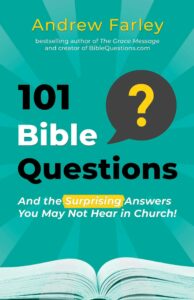Do we have to forgive others in order for God to forgive us?
Quick Answer: Do we have to forgive others in order for God to forgive us? In the Lord’s Prayer (Matthew 6:5-15), we see a forgiveness from God that is conditional and based upon forgiving other people first. But when we read the passage in the context of the Sermon on the Mount, we discover that Jesus is wanting His Jewish audience to imagine receiving only the same type and degree of forgiveness that they’ve given to others. In this way, Jesus is pointing out their hypocrisy, their slavery to bitterness, and their inability to merit God’s forgiveness. Ultimately, this realization is what drives a person to see their need for God’s grace. Today, on this side of the cross, we believers are totally forgiven people, apart from our forgiving of others (Colossians 3:13; Ephesians 4:32; Hebrews 10:14).
Diving Deeper: Let’s start with the end of the Lord’s Prayer (Matthew 6:12-13). It is clear that Jesus is teaching His audience (the Jews of His day) that they should ask God to forgive them to the same degree and in the same way they have forgiven others: “And forgive us our debts, as we also have forgiven our debtors.”
Forgive us as we also have forgiven? Jesus’ meaning is clear. He is setting forth a conditional forgiveness that is based on their performance in forgiving others first. If there were any doubt about this, Jesus expounds upon His intention in verses 14-15: “For if you forgive other people for their offenses, your heavenly Father will also forgive you. But if you do not forgive other people, then your Father will not forgive your offenses.”
Notice the conditional “if” in each verse. If they forgive others, then God will forgive them. But if they do not forgive others, God won’t forgive them. Now, is this the Gospel? Clearly, no. We believers are not forgiven because we have treated others well. We are forgiven because of the shed blood of Christ on Calvary.
So, why would Jesus teach this? Keep in mind that it was before the cross, before His blood was shed. And His audience was under the Law. In this same sermon, Jesus invites His hearers to cut off their hands, to pluck out their eyes, and to be perfect like God. Further, He tells them they need to get right with their brother before offering their animal sacrifices (which we believers do not offer!). He also says they will be answerable to the Sanhedrin (a Jewish council from two thousand years ago).
There is a clear Jewish context to this sermon, and the prayer concerning forgiveness is no exception. Jesus is exposing the Jews’ hypocrisy by highlighting that, if they were to receive the same kind of forgiveness they’ve been doling out to others, they would surely be condemned.
Because of the cross, Colossians 3:13 and Ephesians 4:32 present a different kind of forgiveness for believers today. Both passages say we are to forgive others because the Lord already forgave us. Which came first? God’s forgiveness through Jesus on the cross. Now, we merely pass this same type of forgiveness on to other people, because we already enjoy it in Christ.
In conclusion, a believer’s forgiveness is not contingent upon their ability to forgive others first. The Lord’s Prayer was designed to show the Jews their addiction to the sins of bitterness and resentment and their need for God’s grace. Therefore, it is wrong for us to look to the Lord’s Prayer to understand our forgiveness today. Instead, we look to the cross where Jesus died and proclaimed that “it is finished.” We are totally forgiven people, and we now have the privilege of forgiving others just as God has forgiven us.
Let’s Make It a Conversation!
1. React to this statement: The Lord’s Prayer presents a conditional forgiveness from God that contradicts the Gospel (Colossians 3:13, Ephesians 4:32).
2. How does understanding the dividing line of the cross help us interpret the forgiveness presented in Matthew 6?
3. Why do you think so many recite the Lord’s Prayer when Jesus Himself warned against meaningless repetition of prayers in the same passage (Matthew 6:7)?
4. Read Colossians 3:13 and Ephesians 4:32. How are these different from what we see in the Lord’s Prayer? What are your thoughts on forgiving others now that you’re forgiven?
 101 Bible Questions: And the Surprising Answers You May Not Hear in Church is now available on Amazon!
101 Bible Questions: And the Surprising Answers You May Not Hear in Church is now available on Amazon!Tags: Colossians, Colossians 3:13, Ephesians, Ephesians 4:32, Forgiveness, Grace, Hebrews 10:14, Jesus Christ, Jews, Lord's Prayer, Matthew, Matthew 6:12-13, Matthew 6:14-15, Matthew 6:5-15, New Covenant, New Testament, Prayer, The Cross

